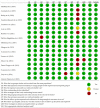Ultra-Processed Food Consumption and Incidence of Obesity and Cardiometabolic Risk Factors in Adults: A Systematic Review of Prospective Studies
- PMID: 37299546
- PMCID: PMC10255607
- DOI: 10.3390/nu15112583
Ultra-Processed Food Consumption and Incidence of Obesity and Cardiometabolic Risk Factors in Adults: A Systematic Review of Prospective Studies
Abstract
Ultra-processed foods (UPF) are energy-dense, nutritionally unbalanced products, low in fiber but high in saturated fat, salt, and sugar. Recently, UPF consumption has increased likewise the incidence of obesity and cardiometabolic diseases. To highlight a possible relationship, we conducted a systematic review of prospective studies from PubMed and Web of Science investigating the association between UPF consumption and the incidence of obesity and cardiometabolic risk factors. Seventeen studies were selected. Eight evaluated the incidence of general and abdominal obesity, one the incidence of impaired fasting blood glucose, four the incidence of diabetes, two the incidence of dyslipidemia, and only one the incidence of metabolic syndrome. Studies' quality was assessed according to the Critical Appraisal Checklist for cohort studies proposed by the Joanna Briggs Institute. Substantial agreement emerged among the studies in defining UPF consumption as being associated with the incident risk of general and abdominal obesity. More limited was the evidence on cardiometabolic risk. Nevertheless, most studies reported that UPF consumption as being associated with an increased risk of hypertension, diabetes, and dyslipidemia. In conclusion, evidence supports the existence of a relationship between UPF consumption and the incidence of obesity and cardiometabolic risk. However, further longitudinal studies considering diet quality and changes over time are needed.
Keywords: NOVA; adults; cardiometabolic risk; cohort study systematic review; obesity; ultra-processed foods.
Conflict of interest statement
The authors declare no conflict of interest.
Figures
References
-
- World Health Organization . World Obesity Day 2022—Accelerating Action to Stop Obesity. World Health Organization; Geneva, Switzerland: 2022. [(accessed on 25 January 2023)]. Available online: https://www.who.int/news/item/04-03-2022-world-obesity-day-2022-accelera....
Publication types
MeSH terms
LinkOut - more resources
Full Text Sources
Medical



